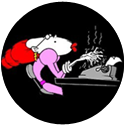
Stars: Clive Owen , Lothaire Bluteau, Brian Webber
Martin Sherman adapted his own play by the same name for this screen version of homosexuals coping during the Nazi rein of World War II.
If you remember the decadence of the film “Cabaret”, you can imagine the opening images of “Bent”. It was a carefree existence for some as they club-hopped,. dressed up and made love. That was before the Nazi’s took offense and went hunting for individuals. The Germans didn’t know who they hated more, Jews or homosexuals, so both groups were sent off to the concentration camps. Some unfortunate souls were killed outright.
Max and Rudy are one carefree couple who end up in a mad escape for their lives after witnessing a gay soldier get his throat cut by the SS. They’re captured as they try to take cover in the woods and then are shipped by train to a camp.
Just because he wears eyeglasses, Rudy gets the brunt of German anger and he’s tortured on the train. Another captive, a Jew named Horst, warns that Max will suffer the same fate if he even acknowledges knowing Rudy. So, Max chooses survival and denies he is Rudy’s friend. He is filled with denial that the events are even taking place but Horst assures him that everything is quite real. Terrified, Max goes so far to disguise his sexual preference that he steals a yellow Star of David to pin to his jacket instead of the pink triangle that homosexuals were made to wear.
Once at the camp, Max ends up befriending Horst despite his desire to survive by denying his true identity. The relationship grows through the many seasons that they’ve spent together and comes to a tragic ending.
This is very mature subject matter that may prove offensive to some. There are many sexually descriptive passages as opposed to sexually depicted ones and some non-sexual nudity. The descriptive passages come inside the prison camp as Max and Horst perform “psychological sex” on each other – I guess it would be called phone sex in another era – as it was they were standing at attention during their rest break from their idiotic chore of moving rocks from one pile to another. This is where the feel of the play comes in full force as each uses very clipped dialogue to express what they were thinking of doing sexually to the other.
I remember reading a review of the Broadway play which starred Richard Gere. The criticism there was that the actors were moving their hips as they performed this sequence. Since a German soldier was watching them at all times, they most likely would have been shot instantly for such behavior. The movie avoided this by staying tight on the actors faces as they said their dialogue. It’s very effective. But, absolutely nothing else goes on at the camp other than scenes of Max and Horst moving rocks. It gets boring but the actors really do a fine job of keeping the momentum up and with lesser actors it might have been a real drag.
My biggest criticism is with the direction at the end. I don’t want to give it away, but Max’s dialogue was superfluous and distracted from his feelings and the action that followed. Sometimes writers and directors don’t have faith in the actor just behaving.
Clive Owen as Max, Lothaire Bluteau as Horst and Brian Webber as Rudy all give believable, interesting performances. Mick Jagger appears early in the film and is quite good as a drag queen at one of the clubs. Overall, the film is beautifully shot and worked although some scenes do give you the feel of a play.
Lotta says this is an interesting but unusual look at hate and love in the microcosm of a Nazi prison camp.
